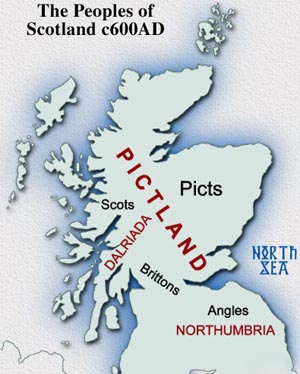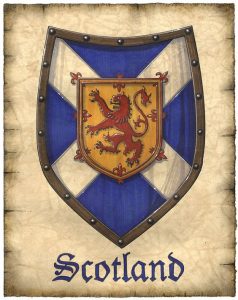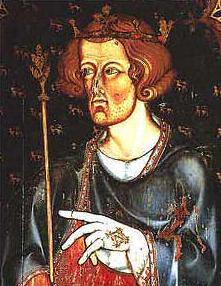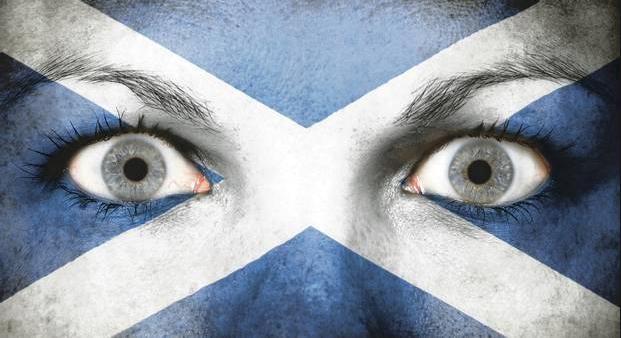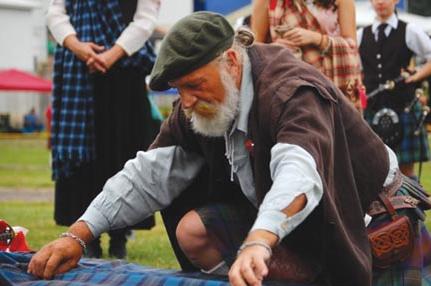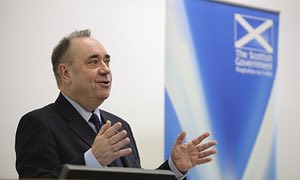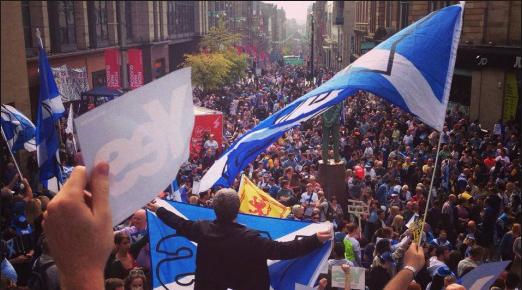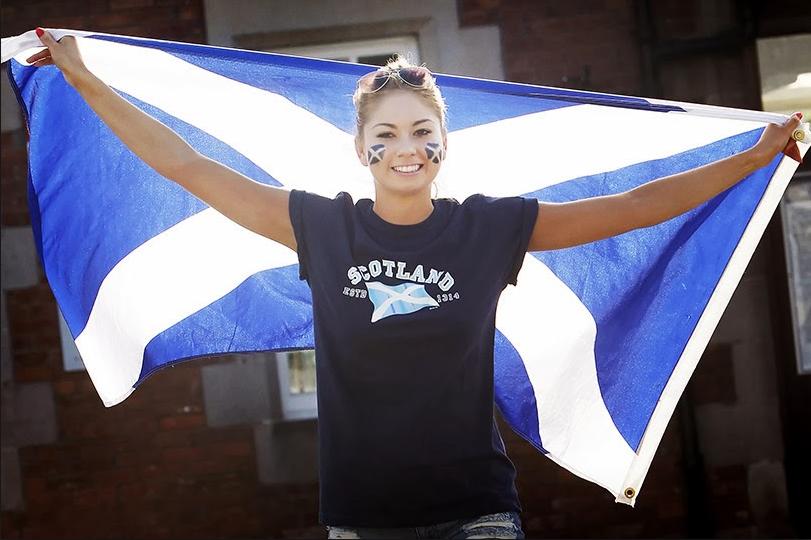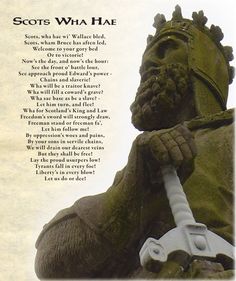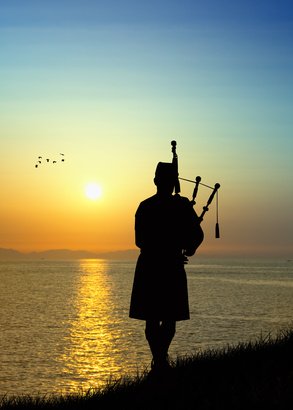Scottish Independence Referendum 2014 – another step toward the Sovereignty of the People of Scotland
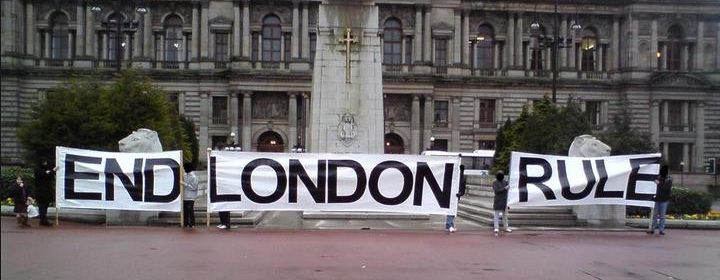
It’s up to the strong women of Scotland. A referendum on Scottish independence took place on 18 September 2014.
The referendum question, which voters answered with ‘YES‘ or ‘NO‘, was “Should Scotland be an independent country?” …rather than a territory of the UK ruled from Westminster Palace albeit with a smattering of autonomy – Tokenistic Home Rule.
Sovereign History of the Scots (a tad brief)
Scottish independence (from London’s Westminster Central Rule) predates Scotland’s forced union with England and Wales.
Scotland as the northern region of Briton (the island of Great Britain) evolved separately from the south since ancient times. The Bronze Age and Iron Age Picts and Gaels were each a distinctly different Celtic people of the north with their respectively different territories, language, traditions, myths, lore and customs.
To the south were originally the ‘Anglii’ or ‘Angles’, one of a number of ancient indigenous clans who had colonised Briton from north western Europe from 14,000 BC as the last Ice Age melted, separating the British Isles from Europe by a new sea.
Apparently, from AD71 invading Romans to Briton named its forested region north of the rivers Forth and Clyde ‘Caledonia’, documenting that the various local clan tribes spoke what is now referred to as ‘Pictish’.
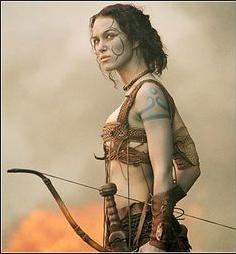 The Romans called them ‘Caledonians’ and later ‘Picti’. ‘Pict’ being a Roman Latin word for paint, as the invading Roman legions observed the defending warriors in face paint in battle.
The Romans called them ‘Caledonians’ and later ‘Picti’. ‘Pict’ being a Roman Latin word for paint, as the invading Roman legions observed the defending warriors in face paint in battle.
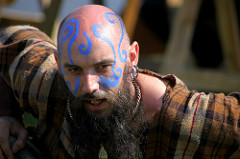 Scotland’s ancient north and its people were recognised as distinct from the south which the Romans called ‘Britannia’, who spoke a Celtic Brittonic language before the influence of Roman Latin.
Scotland’s ancient north and its people were recognised as distinct from the south which the Romans called ‘Britannia’, who spoke a Celtic Brittonic language before the influence of Roman Latin.
 In the Fifth Century, the Saxons invaded and colonised Britannia, integrating with the local Anglos evolving into Anglo-Saxons.
In the Fifth Century, the Saxons invaded and colonised Britannia, integrating with the local Anglos evolving into Anglo-Saxons.
Separately to the north, the Scottish people have evolved from the amalgamation of the Picts and the Gaels, who founded the Kingdom of Scotland (or Alba) in the 9th century, and are thought to have been ethno-linguistically Celts.
Later, the neighbouring Cumbrian Britons, who also spoke a Celtic language, as well as Germanic-speaking Anglo-Saxons and Norse, were incorporated into the Scottish nation.
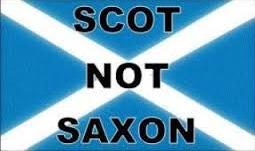 Scotland emerged as an independent ‘polity’ (sovereign self-ruled state) during the Early Middle Ages, with some historians dating its foundation from the reign of Kenneth MacAlpin in 843. Scottish kings have fought for centuries unsuccessfully to establish a fsingularly unified Scottish Kingdom.
Scotland emerged as an independent ‘polity’ (sovereign self-ruled state) during the Early Middle Ages, with some historians dating its foundation from the reign of Kenneth MacAlpin in 843. Scottish kings have fought for centuries unsuccessfully to establish a fsingularly unified Scottish Kingdom.
London OverLord
But the watershed of when Scotland lost its sovereignty to an external power was in 1290 when Edward I of England claimed the right of succession to the Scottish throne.
Despite centuries of wars to regain independent sovereignty by Scottish nobles up until the 18th Century, England has since ruled Scotland from London.
The United Kingdom of Great Britain and Ireland was formed by the Acts of Union 1800, which legally united the Kingdom of Great Britain.
Quests to Reclaim Scottish Sovereignty ‘Saor Alba’
But London’s imposed union has not silenced Scottish nationalist demands for the right to ‘Home Rule’. In 1853 the National Association for the Vindication of Scottish Rights formed in protest.
Yet the discovery of North Sea oil off the east coast of Scotland in 1970, guaranteeing an independent lucrative source of revenue, certainly invigorated nationalist justification for Scottish independence.
Scotland’s first devolution referendum took place in 1979. Scotland said ‘YES’ – 52% to 48% – but from a voter turnout of just 63.6% of Scots. But technical manipulation of the voting rules by London denied the Scottish win being ‘valid’, then Westminster Parliament subsequently repealed the Scotland Act (for independence).
Bastard London tyrant!
But the Scots didn’t give up their quest and right for freedom.
They embarked on a Campaign for a Scottish Assembly. They published the ‘Claim of Right’ in 1989 and formed the Scottish Constitutional Convention and in 1997 proposals commenced to establish a new Scottish Parliament in Scotland’s ancient royal capital, Edinburgh.
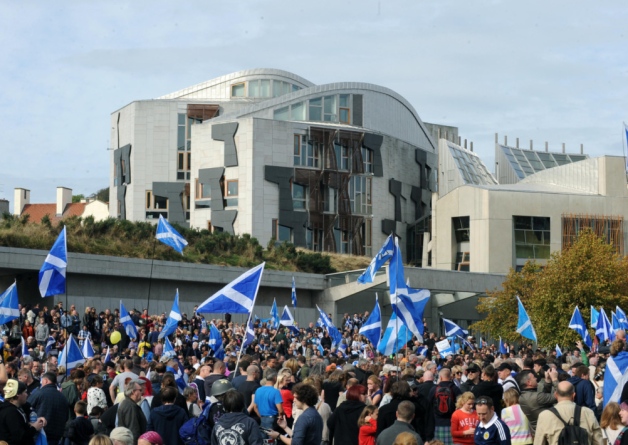 A referendum was held in September 1997 and YES got 74.3%, by 44.87% but this was over London’s technical minimum turnout rule. So a wee win along the way.
A referendum was held in September 1997 and YES got 74.3%, by 44.87% but this was over London’s technical minimum turnout rule. So a wee win along the way.
Westminster let the Scots have their own elected single house Scottish Parliament (since 1707) to decide Scottish domestic policy, but not to raise taxes (nicknamed the Tartan Tax).
Big of the London tyrants!
2014 Scottish Referendum for Independence
So the Scottish Independence Referendum Bill, drafted this time by Scots and passed by the Scottish Parliament in November 2013, set out the voting rules. Scottish simplicity prescribed that to pass, the independence proposal required a simple majority.
Home Rule makes sense – no Westminster pompous bureaucracy.
Scottish citizens resident in Scotland aged 16 or over could vote – some 4.3 million of the fine people.
The referendum wording simple.
“Do you agree that Scotland should be an independent country?”
Westminster promised that, if a simple majority of the votes cast were in favour of independence, then “Scotland would become an independent country after a process of negotiations”…without delay.
If the majority was against independence, Scotland would continue within the United Kingdom, but further powers would be devolved to the Scottish Parliament as a result of the Scotland Act 2012.
Scottish First Minister Alex Salmond, leader of the Scottish National Party driving the independence movement, led a campaign that energized all of Scotland.
Scottish Voter Turnout
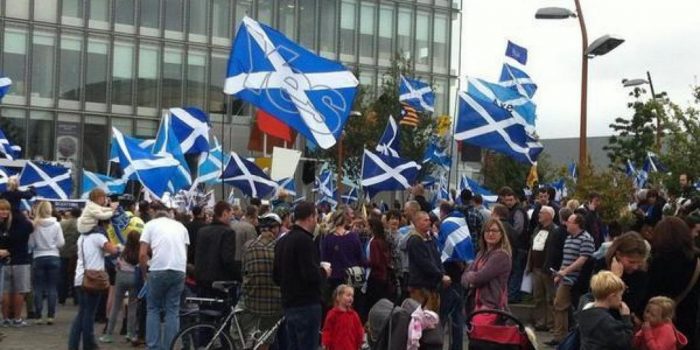 Scottish voter turnout of 84.6% was the highest recorded for an election or referendum in the United Kingdom since the introduction of universal suffrage. Scots aged just 16 and over were respectfully gifted their citizen right to vote for their nation.
Scottish voter turnout of 84.6% was the highest recorded for an election or referendum in the United Kingdom since the introduction of universal suffrage. Scots aged just 16 and over were respectfully gifted their citizen right to vote for their nation.
The Referendum Result
The ‘NO’ side won in 2014
The results were 2 million Scots (55.3%) voting ‘NO‘ for Scottish independence, while 1.6 million Scots (44.7%) voted ‘YES‘ for Scottish independence.
Scots were allowed to have their say. The count was valid with an impressive 3,619,915 or 99.91%, and just 3,429 votes rejected as invalid or disinterestedly blank.
But was it fair?
Champion areas of Scotland who voted ‘YES’ for Scottish sovereignty were:
- Dundee
- Glasgow
- North Lanarkshire
- West Dunbartonshire
Scottish First Minister Alex Salmond went down fighting for what he called a once-in-a-lifetime chance to win back the nation’s independence.
Afterwards Salmond said that he accepted the “verdict of the people” and graciously called upon “all Scots to follow suit in accepting the democratic verdict of the people of Scotland”. He called the referendum a “triumph for the democratic process and for participation in politics”.
But even in losing, he gained promises from Westminster politicians like PM David Cameron of devolving important new powers to the Scottish Government.
Salmond then fell on his sword resigning honourably as SNP leader and as Scottish First Minister, saying that “for me as leader my time is nearly over but for Scotland the campaign continues and the dream shall never die”.
London-based BBC’s Institutional Bias manipulated ‘NO’ Vote to Win
BBC pro-No vote support and scaremongering deliberately manipulated the referendum outcome. The propaganda was led by BBC’s political editor Nick Robinson based in London.
In January 2014, a year-long academic study by the University of the West of Scotland’s Dr John Robertson found that coverage by the BBC and the Scottish commercial channel STV had biasedly favoured the ‘NO’ campaign.
In March 2014, BBC Scotland chiefs appeared before a Scottish Parliament committee to face questions from MSPs about the broadcaster’s coverage.
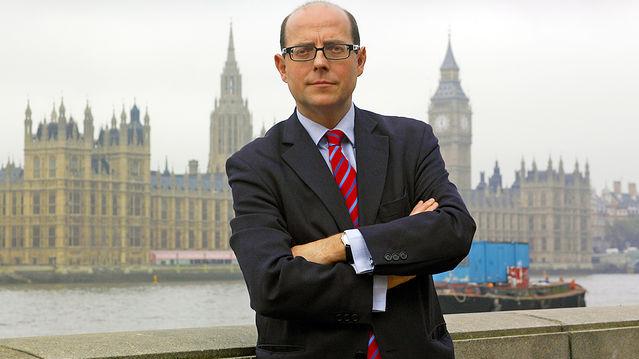 BBC’s Nick Robinson caught manipulating public debate against Scottish Independence
BBC’s Nick Robinson caught manipulating public debate against Scottish Independence
During the latter stages of the campaign there were further allegations by some independence supporters that the BBC – the UK’s national broadcaster – was biased against Scottish independence.
In an interview for the Sunday Herald, Scottish First Minister Alex Salmond said he believed the BBC had been unconsciously biased against independence. Similarly, indeed former BBC journalist Paul Mason commented:
“Not since Iraq have I seen BBC News working at propaganda strength like this”.
On 29 June 2014, several hundred independence supporters gathered in a demonstration outside the BBC Scotland headquarters in Glasgow in protest at the BBC’s alleged bias. Several thousand independence supporters protested at the BBC Scotland headquarters, accusing the BBC of broadcasting pro-Union “propaganda” and “lies”.
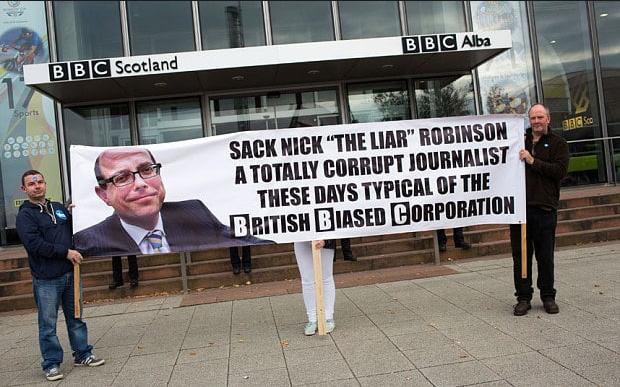 The Independent reported that the protesters accused Nick Robinson of conniving “with the Treasury to spread lies about the dangers to business and financial services of an independent Scotland”.
The Independent reported that the protesters accused Nick Robinson of conniving “with the Treasury to spread lies about the dangers to business and financial services of an independent Scotland”.
Alastair Campbell said that the “organised protests” amounted to media censorship “not far off” Vladimir Putin’s Russia, telling Twitter users they should “Vote YES for intimidation”.
Scotland’s Yes Campaign was also hoodwinked and manipulated by Marxists Globalists group ‘Counterfire‘ out of New York [Read More].
Scottish Nationalism Persists
In the weeks following the referendum, thousands of people joined the Scottish National Party, the Scottish Green Party or the Scottish Socialist Party, which had all supported a ‘YES’ vote.
The parties claimed that many of the new members were former Scottish Labour Party members. By 2 October, SNP membership had trebled from 25,000 to 75,000, making it the third largest political party in Britain.
Following the referendum there were calls for greater unity within Scottish Unionism and to vote tactically against Nationalist candidates.
A grass-roots campaign called “Scotland in Union” aimed to encourage tactical voting at the British general election, 2015 and to publicise the benefits of being part of the United Kingdom. Cameron won the 2015 election.
Further Devolution
 Two days before the referendum, the leaders of the three main UK political parties publicly pledged to devolve “extensive new powers” to the Scottish Parliament. They also agreed to a timetable proposed by Gordon Brown.
Two days before the referendum, the leaders of the three main UK political parties publicly pledged to devolve “extensive new powers” to the Scottish Parliament. They also agreed to a timetable proposed by Gordon Brown.
In his speech responding to the referendum results, David Cameron said that an all-party commission, chaired by Lord Smith of Kelvin, would oversee the implementation of the new powers. The bill devolving further powers to Scotland was passed unanimously by the Scottish parliament in March 2016.
Cameron also called for an answer to the West Lothian question, by removing the right of Scottish MPs to vote on legislation relating only to England.
Why would Scots want to interfere with what the English do in England, and not move on from the centuries of how London tyranny has colonially interfered with the lives and rights of the Scottish people?
It’s up to the strong women of Scotland. The men have shown themselves to be a tragic pushover.

